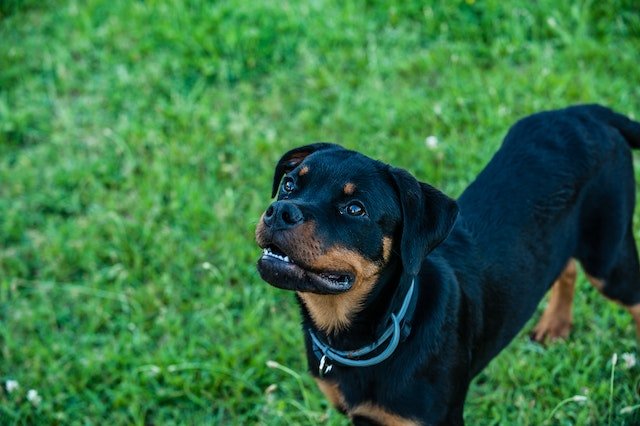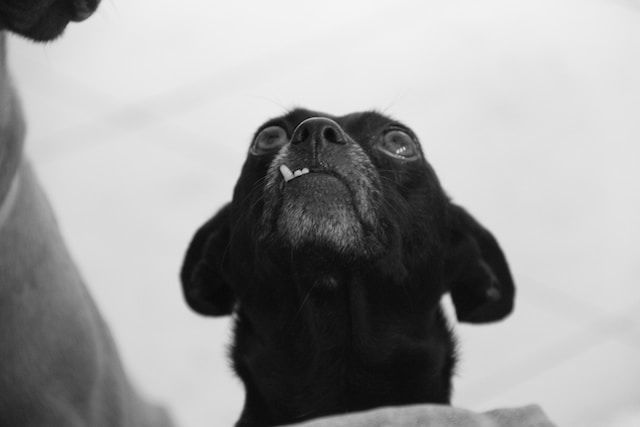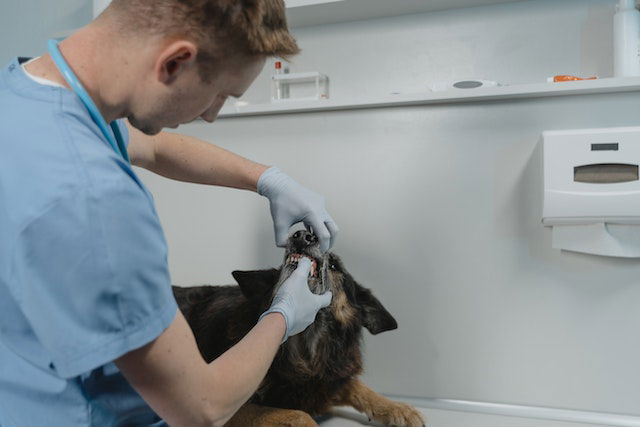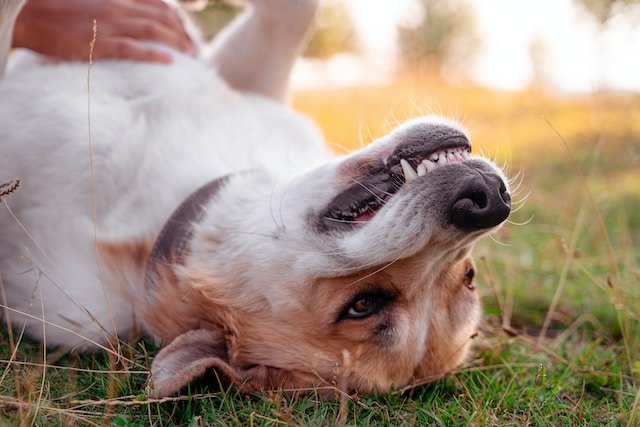We're an affiliate
We hope you love the products we recommend! Just so you know, we may collect a share of sales or other compensation from the links on this page at no additional cost to you. Thank you if you use our links, we really appreciate it!
Some pet parents can get alarmed when their dog repeatedly ‘click’ the upper teeth with the bottom ones.
For most dog owners experiencing this, the first solution is always to redirect their lovely pups to a warm spot because they suspect cold. Some may also offer the dog an arm to nibble on.
This is partly because humans may chatter their teeth with considerable body shakes when experiencing chilly weather.
But, are these the only reasons why your furry friend may chatter his teeth? Keep reading this post as we unpack the reasons for this behavior in dogs and provide practical solutions to solve the problem.
Dog Teeth Chattering; What Is It?
Before we proceed any further, we need to understand what it means when a dog’s teeth chatter.
Teeth chattering occurs in dogs when the masticatory muscles begin to shudder causing the teeth to crash together rapidly and repeatedly.
This action is mostly involuntary in dogs and they may crash the teeth with considerably less vigor compared to chewing.

Teeth chattering in dogs has sometimes been confused with teeth grinding which is medically known as bruxism.
Teeth grinding occurs when the top set of teeth persistently rub against the bottom set in a side-to-side motion leading to dental wear (attrition).
Snapping is another behavior commonly confused with teeth chattering. The former happens when dogs open their mouth wide before deliberately biting into the air.
Dogs may occasionally snap into the air when they feel threatened, protective, or when reacting to irritation.
Why Is My Dog Chattering His Teeth?
Your dog may chatter teeth for several reasons ranging from mild ones to more serious ones. As odd as this behavior may seem to be, it can give a good indication of your pet’s behavior and health.
1. Dental problems
One of the most common reasons (and perhaps the most serious) for teeth chattering in dogs is dental problems.
A dog with periodontal diseases, fractured teeth, or dental abscesses can experience severe pain and discomfort leading them to chatter their jaws.
Oral diseases such as mouth ulcers or cancer are also painful for the dog and they may lead to teeth chattering even though they don’t directly affect the teeth.
- Other signs of dental problems in dogs include:
- Bad breath (halitosis) – a sign of bacterial infection
- Bleeding gums – results in bloody saliva/blood in chew toys
- Difficulty in eating or drinking – may lead to weight loss
- Discolored teeth (Yellowish or brownish)
- Excessive drooling
- Inflamed gums
- May prefer eating soft foods instead of hard bones.
- Missing teeth
If you notice any signs of dental problems in your dog, you should visit the vet for an oral examination and proper diagnosis.
2. Nervousness, stress, and anxiety
Dogs may exhibit teeth-chattering behavior when they’re nervous about something to come. You may notice your dog trembling in the waiting room at the vet’s office for a routine check.
These feelings are quite normal and they show how dogs may struggle with certain nervous moments.
Some dogs may show full body shakes, teeth chattering, or even whining when they’re terrified about certain triggers.

If your furry friend only chatters their teeth when in anxious situations, then this could be a stress response to certain triggers.
The moment your dog comes out of the intimidating circumstance, they may relax and completely stop chattering their jaws.
3. They’re excited
Excitement can be a reason why some dogs may chatter with their teeth. Although this is not a universal sign of happiness in dogs, it may still happen on isolated occasions.
Such dogs will chatter their jaws when welcoming their owners back home, greeting new people on walks, or during any joyous moments.
Anticipatory excitement may also prompt some dogs to chatter their teeth. They may engage in this behavior when looking forward to something enjoyable like tasty treats or chew bones.
If you feel like your dog chatters their teeth in response to excitement, then there’s nothing to really worry about.
4. They’re feeling cold
Just like humans, dogs may chatter their teeth when feeling cold. This can therefore be a revealing sign that your furry friend is uncomfortable in chilly weather and they need some heat.
If your dog is chattering teeth while outdoors during the wintertime, then you should bring them inside the house for relief.
When the cold is experienced inside your home, the pup is likely going to show full body shakes with more rapid chatters.
Most dogs usually react to chilly weather by moving closer to the fireplace or avoiding tiled floors. You can offer relief by providing a cozy blanket or putting a pet sweater on them.
If you have a single-coated dog, it may help to invest in a heated dog bed during the cold months of winter, to keep them warm despite the weather conditions.
5. Neurological conditions
In severe cases, teeth chattering in dogs may be a sign of neurological conditions such as epilepsy or compulsive disorders.
Dogs with problems in their nervous system may also experience excessive trembling, head-tilting, abnormal gait, loss of balance, or unusual eye movements.
Teeth chattering due to neural disorders is often not linked to any outside factors and it can happen at random.
If you suspect any unusual activity linking your dog to neurological syndromes, then we suggest talking to your vet immediately.
Your vet will probably ask you to get a clear video of your dog’s behavior before, during, and after showing the signs of neurological disorders.
6. Your dog is in pain
Dogs experiencing discomfort due to pain may chatter their teeth as a way of getting some relief. Oral pain, back pain, injuries, and abdominal pain, are some of the conditions that may induce this behavior.
If you suspect pain as the cause for your dog’s teeth chatters, you should pay close attention to other signs such as hiding, lethargy, reduced appetite, or showing resistance to touches.
7. Perception of strong smell
Does your dog chatter their teeth after sniffing something? Dogs have a very keen sense of smell and they rely on scents to move around.
They have a highly developed scenting system known as the vomeronasal organ (VNO) which is responsible for the semiochemical signal detection in dogs.
Your beloved pup may chatter their teeth and use the tongue to facilitate the movement of the scents into the vomeronasal organ, which is located in the roof of the mouth.
This helps the dog to make sense of the chemical message and act accordingly. It is typically seen when dogs smell each other’s urine ‘flehmen response’ to tap into chemical communication.
This behavior is completely normal in dogs and therefore it should not cause any serious concern when it happens.
8. Age
Senior canines are more prone to show teeth-chattering behavior than middle-aged adult dogs and puppies, and in most cases, it’s nothing to worry about.
Researchers have yet to point out specific reasons for this behavior in mature canines, but postulations have been made citing the weakening jaw muscles in elderly dogs.
If your senior pup is chattering their teeth non-stop, we suggest that you set up an appointment with your vet for a complete checkup.
Should I Be Concerned About My Dog’s Teeth Chattering?
As we have seen above, dogs may chatter their teeth for several reasons ranging from harmless ones to more severe cases.
Your response to this behavior should depend on the exact reason, and it should also help your beloved canine to calm down.
Teeth chattering in dogs is typically a symptom of an underlying cause that needs to be identified before prescribing any treatment.
If your dog is chattering teeth with full body shakes and trembling during a cold month, then this is probably due to the extreme cold temperatures.
In this case, you should move your dog indoors to an insulated room and provide a cozy blanket and warm clothing to help retain body heat.
Teeth chattering due to nervousness or worrying situations is normally a stress response from your dog and it should stop when the triggers are removed.
You may also inquire from the vet on ways to keep your dog calm when confronted with disturbing situations like thunderstorms or vet visits.
Some anxious dogs have shown improvements when given interactive toys during stressful situations, while some dogs can benefit from anxiety relief medication.
When to Visit the Vet
If you highly suspect medical reasons and dental problems as the reasons for your dog’s teeth chattering behavior, then you should seek an appointment with your vet.
Health problems in dogs should be dealt with as early as possible to promote quick recovery and curb discomfort due to pain.

If your dog is linked with neurological disorders such as epilepsy or Shaker’s syndrome, your vet will probably prescribe anti-convulsant medication like Phenobarbital to control seizures.
Lifetime adjustment programs may also be beneficial for dogs with neurological conditions.
Such adjustments include controlled playtime, balance exercise, a regular sleep schedule, a calm environment, or regular hydrotherapy.
Preventive Measures For Dogs Teeth Chattering
1. Regular dental care
Dental problems are one of the major causes of teeth chattering in dogs. Providing regular dental care may help your furry friend avoid dental-related problems.
It is also good for hygiene and the prevention of bad breath in dogs (Halitosis). Make sure to brush your dog’s teeth at least two times a week using canine toothpaste.
Do not use human toothpaste for your dog because it contains compounds that may be toxic to dogs when ingested in high amounts.
Regular brushing helps to remove food remains and prevent the growth of bad bacteria in the oral cavity. It also helps to prevent the formation of plaque.
Giving your dog regulated amounts of dental treats will also help in cleaning the teeth by removing stains and food particles.
2. Create a calm environment for your dog
Dogs desire a stress-free environment as much as we do. You can help your dog’s emotional health by creating a calm environment free from noise and distraction.
Map out a well-lit and secure room for your dog and provide them with all the needed accessories for physical and mental stimulation.
Exposing your furry friend to stressful environments may drive them to form anxiety-related behaviors such as teeth chattering, barking, whining, and destructive chewing.
Frequently Asked Questions (FAQs)
1. Why does my dog chatter his teeth after licking something?
Your dog is responding to the taste, and they’re probably sending the chemical signals to the vomeronasal organ to make sense of it.
2. Is teeth chattering in dogs always a cause for concern?
No! Some dogs may chatter their teeth for no apparent reason, and sometimes for harmless reasons such as a response to cold weather.
But due to the many reasons surrounding this behavior in dogs, it’s always safe to check with your vet so they can rule out any medical condition.
3. Why does my dog chatter his teeth when playing?
This can be a telltale sign that your dog is massively immersed in the excitement and enthusiasm of the game.
Teeth chattering can be a benign way of showing enjoyment and heightened stimulation during playtime.
Your dog may also chatter their teeth when playing with treat-dispensing toys in anticipation of receiving the tasty reward after solving a puzzle.
Closing Thoughts
Many reasons may induce your lovely pup to exhibit teeth-chattering behavior.
Indeed, it’s likely that something as little as a drop in body temperature may cause your beloved pup to chatter their teeth while trembling.
It’s also true that teeth chattering in dogs can be a sign of dental problems such as tooth fractures and neurological disorders like epilepsy.
Some mature furry companions may chatter their teeth involuntarily for no apparent reason. There can be a very thin line between the reasons for this rather confusing behavior in dogs.
If you notice a non-stop pattern of teeth chattering in your dog, we suggest that you book an appointment at your vet’s office as early as possible.
Laura is the founder of Furs'n'Paws. She is a also a pet writer and expert with more than 20 years of experience of working with dogs and cats. She developed a very strong love for animals at a young age. Her passion led her to establish a thriving pet sitting and dog walking business in Dubai. As an expert in pet training, behavior, and nutrition, Laura is committed to helping pet owners and pet lovers by offering high-quality information on a wide range of topics.



No responses yet